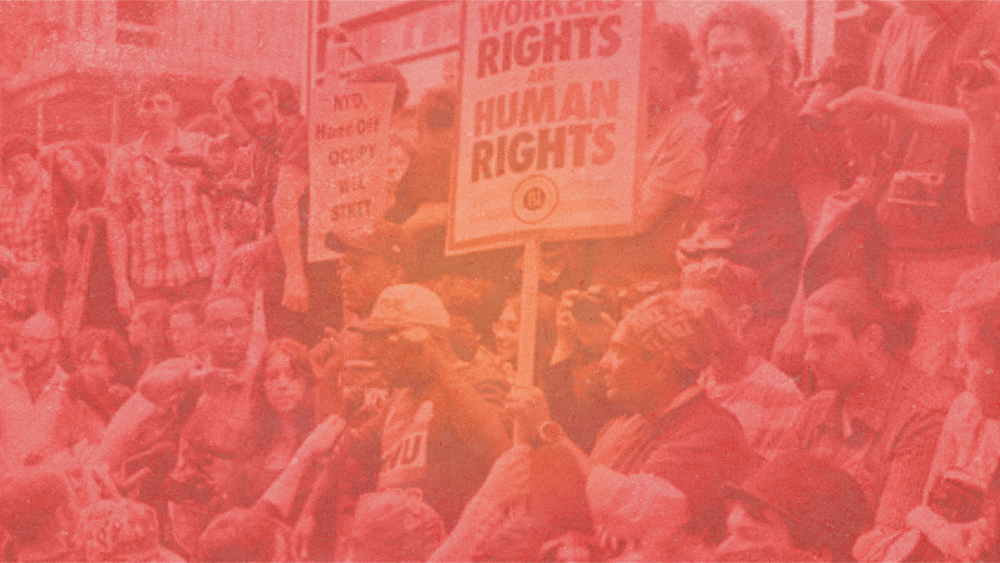As the likes of Amazon and Starbucks do their best to clampdown on employee rights, DiEM25’s Green Jobs Collective provides a platform for much needed unity and discussion among workers
In the current climate of economic uncertainty emanating from years of the imposition of austerity by corporations and governments following on from the global financial crisis over a decade ago, and more recently due to COVID-19 and the current dramatic rise in the cost of living, many workers are expressing their concerns about job conditions and not being paid enough to meet basic living requirements. This has been brought to the attention of the public by reports of how, for example, Amazon has been responsible for unsafe working conditions and unfair treatment of their employees.
A Trades Union Congress (TUC) report has outlined how ‘gruelling conditions, unrealistic productivity targets, surveillance, bogus self-employment and refusal to recognise or engage with unions unless forced’ appears to be a feature of how Amazon operates. Examples given are when the corporation was compelled to increase the minimum wage to $15 an hour but ‘bonuses’ were then reduced.
The response of many workers was to fight back against this by attempting to form unions within corporations in not only Amazon but also, successfully, in Starbucks. This is particularly so in the US where a new trade union, Starbucks Workers United, won votes for unionisation at 177 sites in 30 states. One of the workers welcomed this news by declaring ‘we already know what the power of working together is’.
Corporations, such as Amazon, are endeavouring to push back against this revived militancy by showing that they want to control workers more tightly to enable management to continue with unrealistic and body breaking productivity goals and intrusive employee surveillance and to treat workers as disposable items. But workers have shown that they are not submissively accepting this, with many going on strike at Amazon sites in Germany, France and Italy, and solidarity actions in six continents on Make Amazon Pay Day.
This seems to reflect the growing mood of workers to not only combine together to improve their pay and working conditions, but also to see the power in uniting to have a collective say in the day to day running of the enterprise where they make a living. The billionaire CEOs of these big corporations are becoming unsettled by this. Howard Schultz, who reportedly returned to Starbucks to stop workers unionising, referred to unions as “an outside force that’s trying desperately to disrupt our company”.
In the leaked call, Starbucks’ CEO smeared @SBWorkersUnited with baseless rumors.
“I wasn’t there, but there are stories that people potentially had been bullied not to vote,” Schultz said.
Starbucks has been charged with illegally pressuring workers to vote against the union. pic.twitter.com/vcSuoY0hhA
— More Perfect Union (@MorePerfectUS) April 21, 2022
A trade union representative, concerned about Amazon’s ‘anti-union’ reputation when they opened their first ‘fulfilment centre’ in Dublin, urged them to “engage positively with workers who organise into a trade union”. Amazon management responded by stating that they prefer “direct relationships between managers and employees” because this allows the voice of the employee to be heard. This response poses questions for workers who not only want to be listened to if and when their ‘voices are heard’, but also to be able to make decisions collectively about their working conditions and how the enterprise functions.
In the US, the Starbucks hierarchy tried to disrupt this sense of solidarity by conducting management team meetings with one individual worker at a time. They did this after they had failed to stop the push for unionisation during meetings with groups of workers. This isolation tactic for divide and rule from the ‘anti-union playbook’ also backfired on Starbucks. When one manager threatened that they would not give practical necessary support to a worker on the shop floor when required if they joined a union, the worker replied that this ‘store could be run by the workers themselves without managers’.
Do these developments point to the desire of more and more workers to have some kind of ‘workplace democracy’? In the DiEM25 Green New Deal for Europe policy document ‘Blueprint for a Just Transition’ major transformations are proposed to address the three overlapping crises facing people in relation to the environment, the economy and democracy. This includes the question of providing ‘workers and communities with democratic control over their workplaces’. The Green New Deal for Europe policy checklist for Green Public Works recommends ‘support for the emergence of workplace democracy across the continent, focusing investment on worker cooperatives and community-led projects based on municipal or local ownership’.
DiEM25’s Green Jobs Collective
Some DiEM25 members who were interested in what way this proposed democracy for workers could be realised, and how it could contribute to the resolution of the crises, came together in the Green Jobs Collective.
In our Collective we’ve been working on a ‘discussion document’, which we’ve called ‘DiEM Jobs’. This document includes proposed measures that we believe will help bring about a society where workers will collectively have a real say and democratic input into how their enterprises operate and are run in the interests of the well-being of people and planet. Not for generating vast sums of money for the enrichment of a small number of individuals as it is at present. These measures include ‘voting rights – where all major decisions will be made democratically with each worker owning a single equal share in the organisation and having one vote. This work of our Collective is continuing over the coming months, and we encourage DiEM25 members and friends to join us and help develop it.
Do you want to be informed of DiEM25's actions? Sign up here










